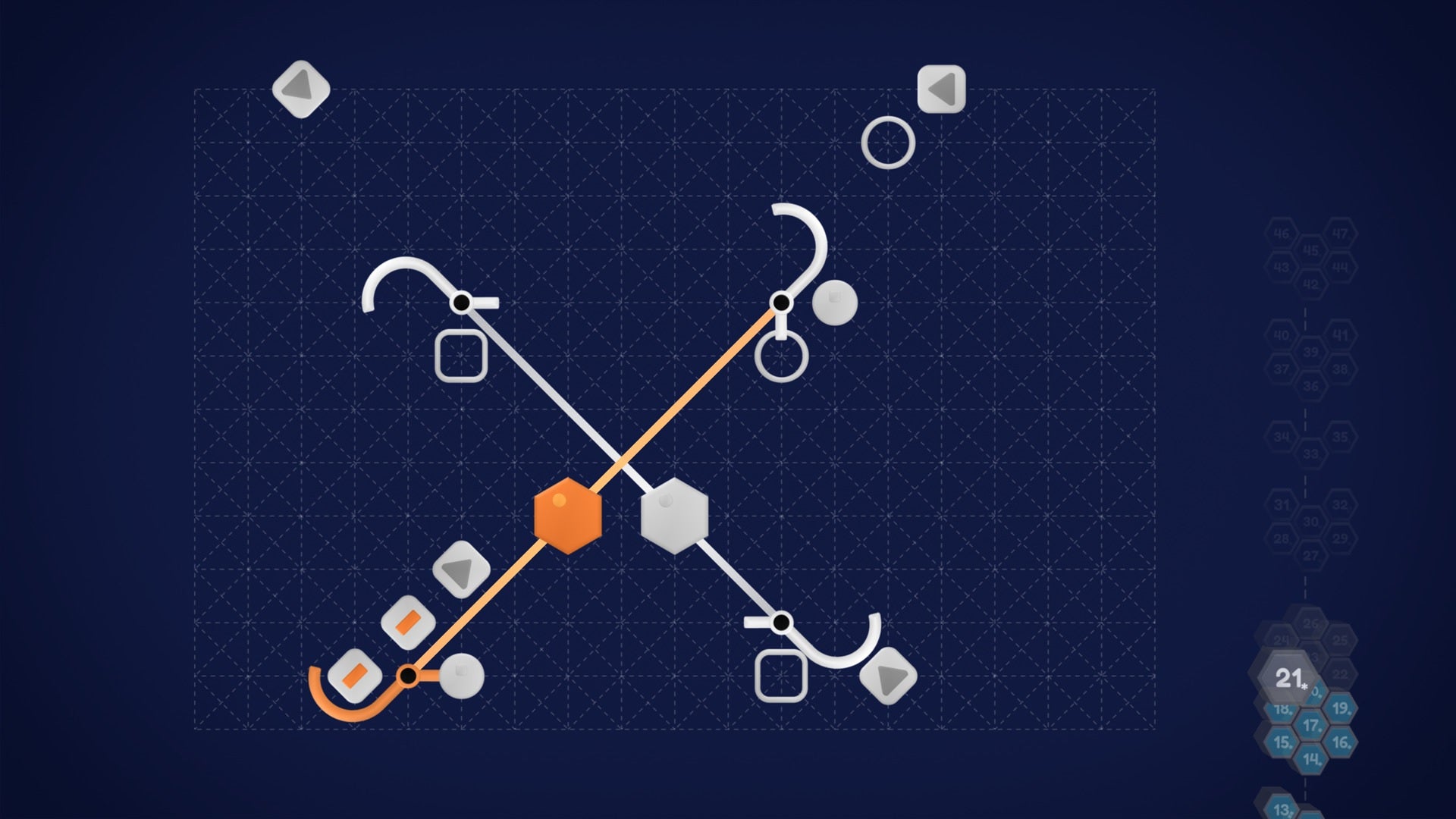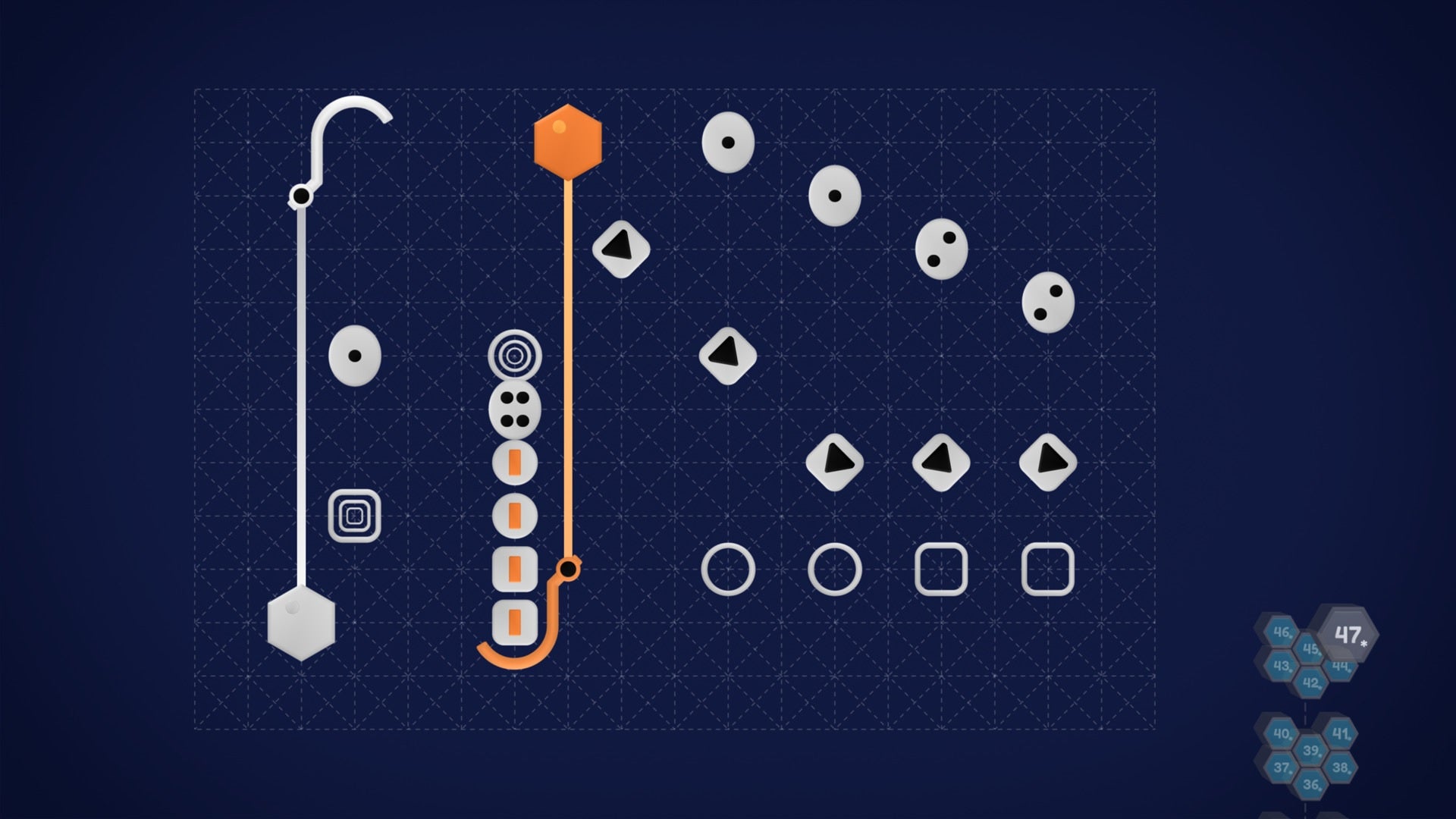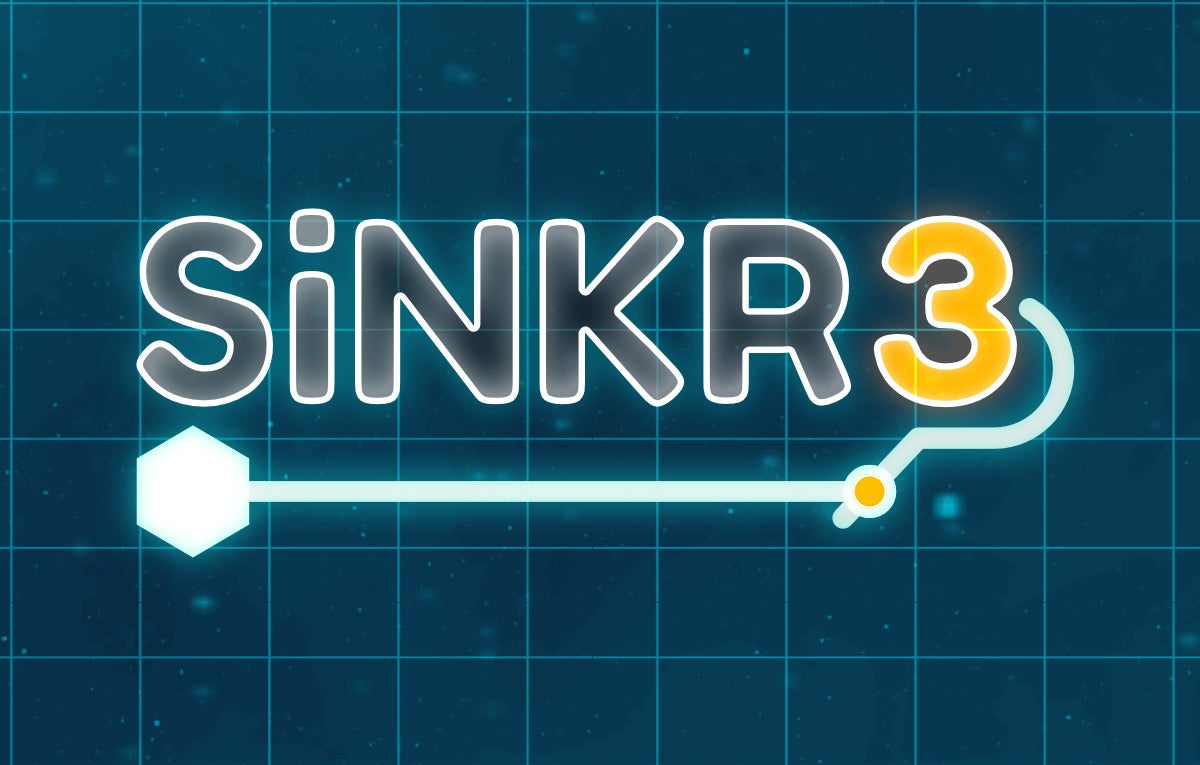Debuting back in 2017 in the crowded market known as “minimalist puzzle games,” Robert Wahler’s SiNKR stood out from the pack for one very simple reason: it had an exceptionally well-executed gameplay hook. Utilizing visual language to teach its mechanics without lengthy tutorial boxes, SiNKR tasked players with figuring out how to drag circles and squares to a goal with fish hooks spread across the screen in devious patterns. While hardly an ultra-deep examination of the human condition, the game accomplished its goal brilliantly and was a modest success for the indie creator.
Now, some five-ish years after the first title was released, Wahler is ready to debut SiNKR 3 on Steam and cap off his puzzle trilogy with the series’ most robust and complete package yet. Having played the first two games and loving them, I wanted to speak to Wahler about his first experience with game development and how his title about fish hooks wound up hooking not only a fanbase but awards for its design.
Humble Beginnings

Robert Wahler’s experience with game development mimics that of other prominent developers from the 80s and 90s. Back in the ancient days of 1991, Wahler acquired a development kit for the HP-100LX, a small 8088 MS-DOS handheld machine. “I remember trying and ultimately failing to create a backgammon game from scratch in C,” Wahler recounted. “That was a learning experience.”
At the time, development was more of a hobby to Wahler. He tinkered with different concepts but didn’t become serious about creating and releasing something until six years ago. When I asked what game finally lit a fire under him, he told me, “Klocki by Maciej Targoni was the first minimalist puzzle game I played on Steam. The wordless progression is lovely and it really clicked with me. It had the biggest impact on inspiring me to take up development.”
While not an ultra-prominent indie title, Klocki was a success for its creator and was the follow-up to one of the most influential minimalist puzzle titles of all time, Hook. Wahler even said as much, stating, “Hook is a super game and it has hooks too!” After developing SiNKR 2, Wahler was even able to bundle his game alongside Hook and another puzzle title, LYNE, for the “Hook, LYNE, and SiNKR” bundle.
SiNKR
As for why Wahler decided upon a simple concept like SiNKR, it came down to scope. Since he is a single-developer team, he didn’t want to reach beyond what he was capable of in that moment. “I decided that a 2D sequence of operations puzzle game would be doable and looked around for real-life things that I could sequence,” he explains. Some of his earliest prototypes included actual fishing rods, reels, and lines.
“I really liked that fishing reels go one way. You can reel them in, but the fish controls the reeling out. That was my ‘Aha!’ moment for the first mechanic.” From there, he took the idea of pucks (or circles) from a mixture of ice fishing and ice hockey. “There were never any fish or hockey pucks, but I hope you get the idea,” Wahler says.
Polished to a Mirror Sheen

The execution of SiNKR makes it seem like such an effortless thing, but Wahler explained to me that each game in the series took about a year and some change of effort, some of which was done part-time. He was able to nail the core ideas within a month or so, but the testing and polishing phase is what made up the bulk of the development.
“Polishing and testing can take as much time as you are willing to give, but at some point, you just have to kick your creation out there.” For the first two games, Wahler recounts how lucky he was to have in-person events help him refine his ideas. Indeed, I played SiNKR 2 at PAX 2019 and Wahler notes others like Dreamhack and Momocon. Getting that hands-on experience and immediate feedback can do a lot for helping you hone in on any issues present with your game.
As Wahler puts it, “There is just no substitution I know of for watching other folks play your game. Watching folks play early versions of SiNKR really helped my design process.” Sadly, this wasn’t a possibility for SiNKR 3 as it inadvertently became Wahler’s pandemic project. Development builds were sent out to testers, but that obviously doesn’t lend itself to in-person discussion.
Maybe because of this or simply because the world has been in a constant state of flux since 2020, SiNKR 3 wound up taking longer to finish. “You would think that by the third game, development would go faster. Sounds reasonable, but I found just the opposite happened.” As Wahler explains, some of that comes down to the various updates he has made to physics interactions, which necessitated more time to polish. “It took me a ton of time to work through. I enjoy the work, though.”
The Hardest Button to Button
That development process isn’t what Wahler would consider the toughest aspect of making games, however. For him, coming up with viable ideas worth spending a year or more of your life turning into a game is the most difficult part. “In the developer realm, the common wisdom is that ideas are cheap, but execution is hard. I really like the execution phase, but I can’t bring myself to execute unless I really love the idea.”
Going back to his quote, Wahler shared that he has notes on literal hundreds of ideas (“I guess ideas are cheap!”) that he hasn’t turned into projects. Some have become prototypes that his wife will play around with while others remain on paper. Sometimes, she can play certain ideas for hours on end, but Wahler admits that he doesn’t enjoy them quite enough to execute them. He’s very happy that his wife is so supportive of the brainstorming process, though.
Unintended Trilogy
SiNKR 3 dropped on @Steam #TODAY! #SiNKR3 is the last SiNKR, the culmination of my minimalist puzzler series. Help out by buying the game for less than a cup of coffee. Thanks! #IndieGame https://t.co/HL7jksvm1n pic.twitter.com/FGBNd4fwFc
— Robert Wahler (@robertwahler) August 25, 2022
With the surprise release of SiNKR 3, it should be self-evident that Wahler never envisioned his plucky indie puzzler as a trilogy. “I planned on a one-and-done with the original SiNKR, but its reception was so positive that I decided I could create a more refined experience with a subsequent version.” That said, neither SiNKR 2 nor 3 add any new contraptions to the mix but act as quality-of-life updates to the first with additional puzzles and fine-tuning. Some of the new improvements even get backported to the previous titles, making them play smoother than their original releases.
As for the potential of a SiNKR Cinematic Universe, Wahler is content to let the series conclude with the third installment. In coming up with a new idea, Wahler said, “Like most developers, I continually create small prototypes of new ideas, but nothing yet has stood out to me.” He explains wanting to develop a puzzle game with more emphasis on exploration, discovery, and narrative. “I’m trying to come up with something unique with a larger scope than SiNKR, but one that allows me to wear most of the hats myself.” As always, his wife will play a key part in figuring out which ideas are the most viable.
If anything here has made you interested in seeking out SiNKR, the trilogy can be found on mobile platforms and Steam for relatively cheap. Each game is $4 with a bundle compiling them all for $12. SiNKR 1 and 2 are also available on Xbox, but potential ports to other platforms are unlikely to happen in the immediate future. A lot of that comes down to recent changes with Unity licensing, which Wahler explains, “Licensing Unity for Xbox has changed recently requiring a subscription that I can’t yet justify based on revenue alone.” He also reiterates another common indie dev complaint that discovery on console platforms is tough. He’s not ruling out the possibility, but he would need some help with the discovery phase.
Parting Words
To cap off our short discussion, I asked Wahler what he hoped players would take away from playing SiNKR. “A sense of satisfaction from solving the more challenging puzzles is what I’m aiming for. I’d also like folks to feel a sense of control and accomplishment when so many other things in life may feel out of their control.”


